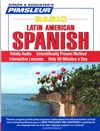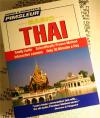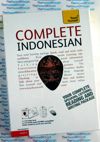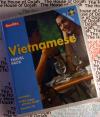Teach Yourself Complete Afrikaans Book and 2 Audio CDs
Book and 2CDs
Are you looking for a complete course in Afrikaans which takes you effortlessly from beginner to confident speaker? Whether you are starting from scratch, or are just out of practice, Complete Afrikaans will guarantee success! Now fully updated to make your language learning experience fun and interactive. You can still rely on the benefits of a top language teacher and our years of teaching experience, but now with added learning features within the course and online.
The course is structured in thematic units and the emphasis is placed on communication, so that you effortlessly progress from introducing yourself and dealing with everyday situations, to using the phone and talking about work. By the end of this course, you will be at Level B2 of the Common European Framework for Languages: Can interact with a degree of fluency and spontaneity that makes regular interaction with native speakers quite possible without strain for either party. Learn effortlessly with a new easy-to-read page design and interactive features:
NOT GOT MUCH TIME?
One, five and ten-minute introductions to key principles to get you started.
AUTHOR INSIGHTS
Lots of instant help with common problems and quick tips for success, based on the author's many years of experience.
GRAMMAR TIPS
Easy-to-follow building blocks to give you a clear understanding.
USEFUL VOCABULARY
Easy to find and learn, to build a solid foundation for speaking.
DIALOGUES
Read and listen to everyday dialogues to help you speak and understand fast.
PRONUNCIATION
Don’t sound like a tourist! Perfect your pronunciation before you go.
TEST YOURSELF
Tests in the book and online to keep track of your progress.
EXTEND YOUR KNOWLEDGE
Extra online articles at: www.teachyourself.com to give you a richer understanding of the culture and history of Afrikaans speakers.
TRY THIS
Innovative exercises illustrate what you’ve learnt and how to use it.
* Approach - the emphasis on communication means that you will learn the language you really need to be able to get the most out of a trip to South Africa.
* New course - this is a completely new, up-to-the-minute course with over two hours of recorded material to help you get your pronunciation right and improve your understanding when people speak to you.
* Culture notes - get behind the language and the people.
Table of Contents:
Introduction
Pronunciation
Greetings
Yes sir, no sir
Please, thank you
Culture and church
Celebrations
Fit, strong, happy
Review
Getting there
Staying there
Cunning shopping
SOS
This is what people do
Review
Follow your stomach
Feed your soul
16 To the veld
17 Review
Key to the exercises
Taking it further
Appendix: useful information
Afrikaans-English vocabulary
English-Afrikaans vocabulary
Grammatical index
About the Author
Professor Lydia McDermott was Director of the Multilingual Studies Programme at the University of KwaZulu-Natal Durban, South Africa. This new edition has been updated by her son and daughter-in-law Liam and Rachél McDermott and her daughter Rachel de Kock.
About the Afrikaans Language
Afrikaans is an Indo-European language, derived from Dutch and classified as Low Franconian Germanic, mainly spoken in South Africa and Namibia, with smaller numbers of speakers in Botswana, Angola, Swaziland, Zimbabwe, Lesotho, and Zambia. Due to emigration and migrant labour, there are possibly over 100,000 Afrikaans speakers in the United Kingdom, with other substantial communities found in Brussels, Amsterdam, Perth (Australia), Mount Isa, Toronto and Auckland. It is the primary language used by two related ethnic groups in South Africa: the Afrikaners and the Coloureds or kleurlinge or bruinmense (including Basters, Cape Malays and Griqua).
Geographically, the Afrikaans language is the majority language of the western one-third of South Africa (Northern and Western Cape, spoken at home by 69% and 58%, respectively). It is also the largest first language in the adjacent southern third of Namibia (Hardap and Karas, where it is the first language of 44% and 40%, respectively).
Afrikaans originated from the 17th Century Dutch language. The dialect became known as "Cape Dutch". Later, Afrikaans was sometimes also referred to as "African Dutch" or "Kitchen Dutch", although these terms were mainly pejorative. Afrikaans was considered a Dutch dialect until the late 19th century, when it began to be recognised as a distinct language, and it gained equal status with Dutch and English as an official language in South Africa in 1925. Dutch remained an official language until the new 1961 constitution finally stipulated the two official languages in South Africa to be Afrikaans and English (although the 1961 constitution still had a sub-clause stipulating that the word "Afrikaans" was also meant to be referring to the Dutch language). It is the only Indo-European language of significance that underwent distinct development on the African continent.
|



 0 Items (Empty)
0 Items (Empty)




